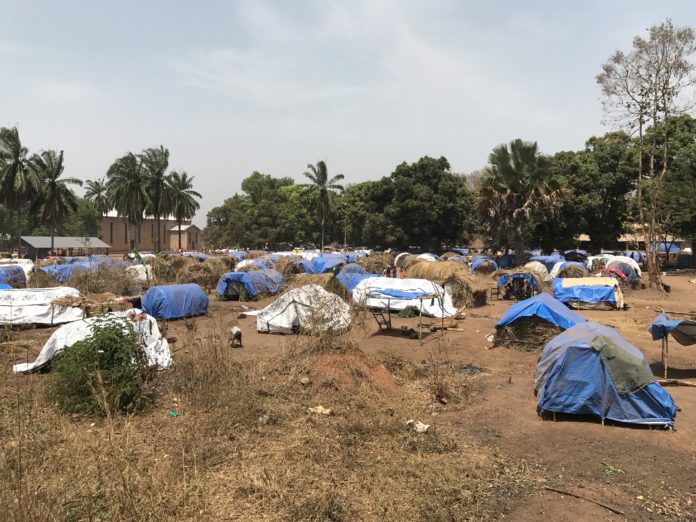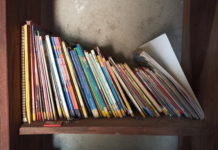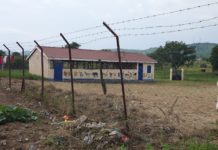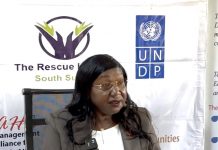
Author: Kenyi Emmanuel
South Sudanese refugees living in settlement camps, in Northern Uganda are caught between a rock and a hard ground. They say they are forced to give a way part of their insufficient food handouts to the hosts, in order to fix a hot meal. For some refugees, getting pieces of wood to make fire is problematic. However, solution is simple – exchange part of your food handouts for some wood, so you can cook.
Refugees are prohibited to go outside of their settlement centers to gather firewood – leaving most of them with no option of preparing food. All of them depend on wood for fuel; as far as cooking is concerned. They complain the locals do not allow them to collect firewood, in the surrounding areas unless they share some of their food items with them.
For many refugees however, sharing their food handouts only comes as a last option. Well aware of the problematic situation, they try to avoid paying the demands whenever they can. Most of them argue their food is not enough, even for themselves.
Middel-aged-mother of two, Grace Ariye, in Rhino camp has devoted to collecting firewood over four kilometers inside the bushes. She argues this way it is hard to be noticed, by anyone, and that most of the time her strategy is successful.
“The issue of firewood is becoming real. If you are lucky you can go get firewood and return without a hitch. Sometimes you end up losing your tools to the locals, when you are caught…” She said
Grace says some times she and other family heads have ‘paid’ part of their food in exchange for firewood, at least once. Situations like this make her hate staying in Uganda anymore.
She wishes politicians in her country, South Sudan; settle their differences so people like her return.
Grace remembers when she ran out of luck. One day she lost her machete plus a knife to the locals. The locals blamed her for trying to collect wood without fulfilling her ‘obligation’ of paying her dues. She says all the ‘payments,’ mostly in form of food is taken to the landlords who own the fields where she and others collect sticks to make fire.
She fled South Sudan in 2016, during the second wave of violence. She says when she had come; there was a small forest near her camp where everyone collected firewood freely. But within months it slowly disappeared. The forest provided poles, too, for making their makeshift huts.
Majority of locals of Invepi host community are envious. They demand equal treatment. According to Biajo, hosts like her want UNHCR to give them ‘free food’ as well.
“They (UNHCR) give these people free flour, free beans, and yet we (hosts) have not benefitted from these items even once,” she complained. Biajo wishes to be identified only by her last name.
Like many others, she goes on to say that she supports the idea of deterring South Sudanese refugees from collecting firewood in her village and other surrounding areas. Biajo thinks refugees like Grace should not leave their camps, especially with the intentions of taking anything at a free cost. Biajo is a resident of Invepi area.
In most cases, UNHCR and other humanitarian agencies establish infrastructure in areas where they create refugee camps. Often both locals and refugees benefit from the developments. Usually, such places get schools, health facilities, better roads, improved water sources and many others for the first time. Even though the facilities are established to help refugees, locals are allowed to use them, too, as much as their counterparts.
It is imperative to mention, UNHCR together with other humanitarian agencies provide eucalyptus poles to new arrivals nowadays, with the intentions of conserving existing trees. But refugees rely heavily on firewood, which they gather in the nearby bushes as well as forests.
The Forest Officer of Uganda’s Arua district, Adiribo Edison, is concerned. He says the vegetation cover is disappearing quickly – and that it is worrying. He believes no one seems to care about the environment. He thinks majority of the humanitarian agencies, operating within the region do not have regard for the environment.
Nonetheless, Edison says it is not too late to recover the lost vegetation cover. He says forest is a renewable resource, if managed well. “I urge partners to replace trees by encouraging tree-planting, and everybody should participate,” he said.
He says if both host communities and refugees are left, unchecked, to cut down trees for their personal use, this country is going to face severe climatic consequences in future.




